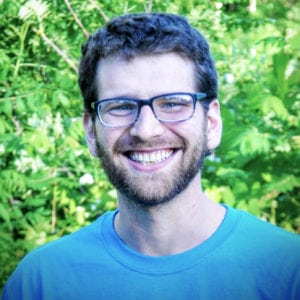The J has become a greener center this summer, thanks to what its members eat, how they eat it, and what they do with the waste when they’re done eating.
Michael Fraade, director of Jewish outdoor, food and environmental education (JOFEE) has undertaken three projects this summer to make the food and waste streams at The J more ecologically friendly:
• At the pool, JOFEE has placed three recycling bins. Also, there is now also a healthy food option on the diner menu — hummus and vegetables – the humus being made locally by Naked Humus under Vaad supervision.
• At the pavilion, where J campers eat their lunch on nice days, three recycling bins and compost bins each have been situated, with older campers separating plastic from leftover food after the meals.
• At the Senior Center, biodegradable plates, bowls, and cups have been ordered to replace polystyrene serving products, which are made from petroleum-based plastic and is a possible human carcinogen.
All three projects are enough done to keep The J’s Hazon Seal of Sustainability. Hazon is a national Jewish environmental organization working to build healthier, greener Jewish communities. It awards the Seal of Sustainability to synagogues, JCCs, and Federations that have met defined goals for achieving greater sustainability.
“The idea behind the seal is for this to be a continuing process,” Fraade said. Each year, at least three projects are selected to make The J a greener facility and maintain its seal.
Hazon first awarded the seal to The J in 2017.
The cost behind this year’s projects is modest. JOFEE spent $000 on the bins, but Fraade noted they were a one-time expense.
Serving products for the senior center will have to be reordered periodically, but Fraade said he was “pleasantly surprised” to learn that they didn’t cost much more than polystyrene.
“Truth be told, it doesn’t cost a couple hundred more per year. I was pleasantly surprised by that.”
He said JOFFEE will split the cost difference with the Senior Center.
“The building was built at a time when sustainability was not in play.”
“As a building, we’re not necessarily leading the way. In terms of an organizational consciousness, it’s something that people have been picking up on over the past couple years.”
His mere presence, Fraade added, demonstrates that.
“People want programming, and they want the building itself to reflect the ways we can contribute to the solution.”
“It’s the kind of thing that encourages behavior change.”




